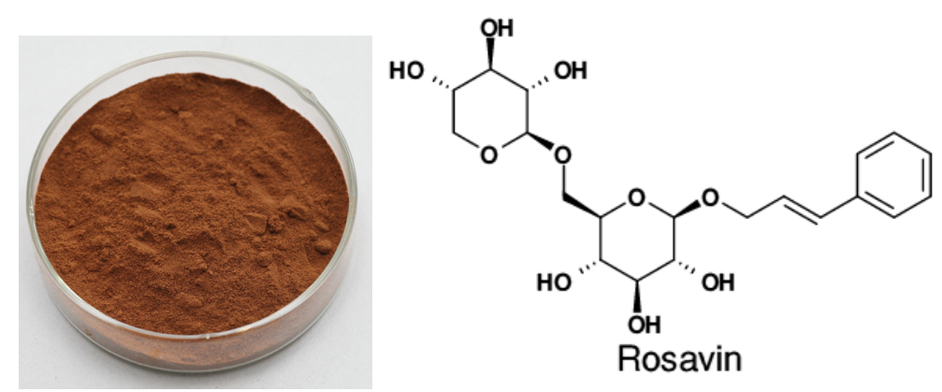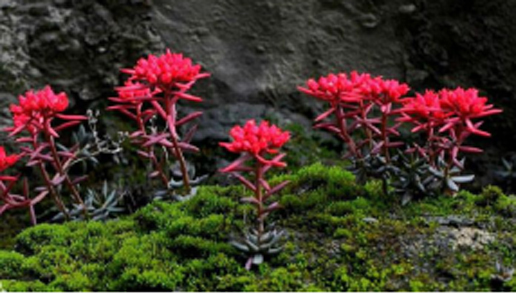One of Hottest for Rhodiola Rosea Extract Manufacturer in Jersey
One of Hottest for Rhodiola Rosea Extract Manufacturer in Jersey Detail:
[Latin Name] Rhodiola Rosea
[Plant Source] China
[Specifications] Salidrosides:1%-5%
Rosavin:3% HPLC
[Appearance] Brown fine powder
[Plant Part Used] Root
[Particle size] 80 Mesh
[Loss on drying] ≤5.0%
[Heavy Metal] ≤10PPM
[Storage] Store in cool & dry area, keep away from the direct light and heat.
[Package] Packed in paper-drums and two plastic-bags inside.
[What is Rhodiola Rosea]
Rhodiola Rosea (also known as Arctic root or golden root) is a member of the family Crassulaceae, a family of plants native to the arctic regions of Eastern Siberia. Rhodiola rosea is widely distributed in Arctic and mountainous regions throughout Europe and Asia. It grows at altitudes of 11,000 to 18,000 feet above sea level.
There are numerous animal and test tube studies showing that rhodiola has both a stimulating and a sedating effect on the central nervous system; enhance physical endurance; improves thyroid, thymus, and adrenal function; protects the nervous system, heart and liver; and has antioxidant and anticancer properties.
[Function]
1 Enhancing immunity and delaying aging;
2 Resisting radiation and tumor;
3 Regulating nervous system and metabolism, effectively limiting melancholy feeling and mood, and promoting mental status;
4 Protecting cardiovascular, dilating coronary artery,preventing coronary arteriosclerosis and arrhythmia.
Product detail pictures:

Related Product Guide:
We have been committed to offering easy,time-saving and money-saving one-stop purchasing service of consumer for One of Hottest for Rhodiola Rosea Extract Manufacturer in Jersey , The product will supply to all over the world, such as: Denmark, French, Greek, With the effort to keep pace with world's trend, we'll always endeavor to meet customers' demands. If you want develop any other new items, we can customize them to suit your needs. If you feel interest in any of our products and solutions or want develop new merchandise, you should feel free to contact us. We are looking forward to forming successful business relationship with customers all over the world.
What is Propolis ? Antiseptic properties. Antibiotic, antibacterial, antifungal & antiviral. Medicinal marvel from the beehive. Reported Research shows it offers antiseptic, antibiotic, antibacterial, antifungal, and even antiviral properties. Propolis is Nature’s premiere preventive.
https://www.durhamsbeefarm.com/index.php/bee-products/honeybee-propolis.html
It is so powerful in action, it is often called Russian penicillin. Propolis is a very sticky substance the consistency of bubble gum from dark to very dark in color. Honey Bees collect resin from certain trees and plants (mostly conifers) to make Propolis. Old beekeepers like me call it bee glue. The bees carry it home like they carry pollen back to the hive but you probably have not read that before. If you consume pollen, you probably have never been told there is Propolis in pollen. It is like gold in a silver mine. You probably have been told, those hard granules in the pollen are due to the pollen having been dried. A lot of those granules could be Propolis. Propolis is hard as steel when it is cool or cold and very very sticky when it is warm. Most people in the states have not even heard the word Propolis let alone know what it is. It is a wonderful product. Spell check in your computer doesn’t even have the word Propolis.
The term “propolis” comes from two Greek words: “pro,” which means “before,” and “polis,” which means “city.” This ancient term came into being centuries ago when some early Greek student of Nature established the fact that honeybees made and used propolis.
Chemically speaking, propolis is a very complex mixture. Its chemical elements vary according to its source. Colors range from golden brown to brownish green to reddish brown to blackish brown. A broad analysis reveals approximately 55 percent resinous compounds and balsam, 30 percent beeswax, 10 percent ethereal and aromatic oils, and 5 percent bee pollen. Many flavonols contribute to propolis. Other components include cinnamic acid, cinnamyl alcohol, vanillin, caffeic acid, tetochrysin, isalpinin, pinocembrin, chrysin, galangin, and ferulic acid.
The supplier abide the theory of "quality the basic, trust the first and management the advanced" so that they can ensure a reliable product quality and stable customers.







